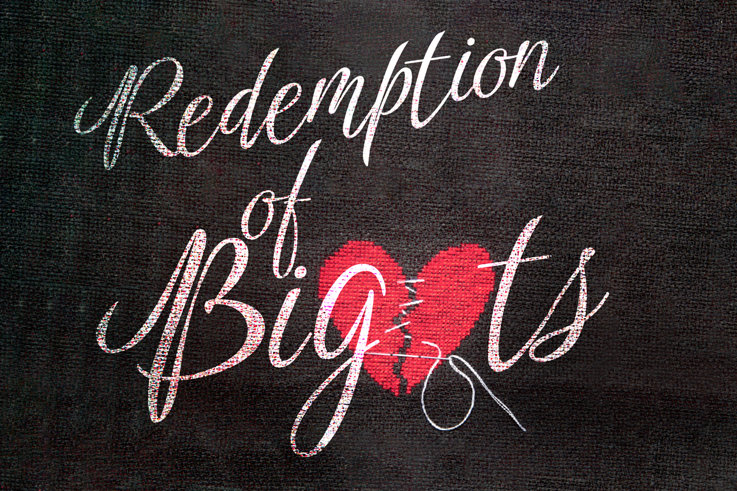
-
HOME
-
WHAT IS STANDOur Mission Our Values Our Help Contact
-
WHAT WE FIGHT FORReligious Freedom Religious Literacy Equality & Human Rights Inclusion & Respect Free Speech Responsible Journalism Corporate Accountability
-
RESOURCESExpert Studies Landmark Decisions White Papers FAQs David Miscavige Religious Freedom Resource Center Freedom of Religion & Human Rights Topic Index Priest-Penitent Privilege Islamophobia
-
HATE MONITORBiased Media Propagandists Hatemongers False Experts Hate Monitor Blog
-
NEWSROOMNews Media Watch Videos Blog
-
TAKE ACTIONCombat Hate & Discrimination Champion Freedom of Religion Demand Accountability
What Ulysses S. Grant and Nick Cannon Can Teach Us About the Redemption of Bigots
It takes a tremendous amount of effort to hate a fellow human being—to ignore all that’s beautiful and good and continue blindly shoving a thousand pounds of stupid up the mountain.
And yet to pause for a breath and look at one’s actions and their consequences is too much of an exertion for most haters.

Most hang on for dear life to their prejudices, more terrified to admit they’re wrong than to do what’s right.
The rapper formerly known as Kanye West is a case in point. In an interview, though given opportunity after opportunity to retract, amend or sugarcoat his adoration of Adolf Hitler, he reiterated, “I like Hitler. Every human being has something of value that they brought to the table. Especially Hitler.”
Especially Hitler. Hey, that’s a great title for a new rap song for the performer, who then spent the next three hours foiling his host’s every attempt to make him seem like a human being.
But fortunately, for every dozen unrepentant bigots, one or two have had the realization, gotten the memo and are truly remorseful.
The bigot who had earlier expelled “the Jews as a class” had transformed himself into their friend and protector.
Nick Cannon is living proof that an individual is always just one thought, one decision, one change of heart away from bigot to big person. In the summer of 2020, the entertainer made such repugnantly antisemitic remarks on a podcast that Rabbi Abraham Cooper was moved to post, “Anyone seeking a PhD in Jew-hatred should watch this ‘interview’ in its entirety.”
Cannon saw the post and was instantly remorseful and apologized.
But Cannon went beyond that. In a series of tweets and on Facebook he said, “There is so much I have yet to learn. I’ve always said that apologies are empty. Apologies are weightless. In Hebrew they call it teshuva, the process of not only repenting, but through that—if you’re ever met with a similar situation, that you make a different decision. That goes beyond apologizing. And I’m on this journey of atonement, not to get a job, not to gain any more money because that’s not what’s needed here. I’m doing this because it’s the right thing to do.”
True to his word, Cannon began his journey by inviting Rabbi Cooper—who accepted—to talk with him on a podcast with a group of Jewish community leaders at the Religious Action Center for Reform Judaism. Since then, he has participated in the formation of the new Black-Jewish Entertainment Alliance to promote communication between the Jewish and Black communities. He is presently continuing his education at Howard University, pursuing a master’s degree in divinity.
“My journey’s not gonna stop, whether the person watching this forgives me or not,” said Cannon. “I’m still going to hopefully get through this process, be on the right side of history and bring people closer together.”
And let us now make a quantum leap from 21st-century entertainer-rapper-actor back-back-back in time to a 19th-century Civil War general, Ulysses S. Grant. And although Grant’s only familiarity with Cannon would have been the kind you fire on your enemy, the two were brothers in that they let their greatness of heart conquer their meanness of action.
General Grant held a low opinion of Jews, accusing “Jews and other vagrants” of “having not honest means of support” and profiting instead through the war. On December 17, 1862, he issued General Order No. 11, expelling all Jews from his military district, an area encompassing parts of Tennessee, Mississippi and Kentucky. The order read, “The Jews, as a class, violating every regulation of trade established by the Treasury Department, and also Department orders, are hereby expelled from the Department,” and threatened arrest and imprisonment for noncompliance. In consequence, dozens of terrorized Jewish families were ousted from their homes.
President Lincoln received a Jewish delegation protesting the order, and in less than three weeks of its issue, Order No. 11 was rescinded. Grant, with the perspective of an honest man, regretted his actions. In a letter reflecting on what he had done, he wrote, “I have no prejudice against sect or race, but want each individual to be judged by his own merit.”
As Nick Cannon did a century and a half later, Grant proved the truth of his words with his actions. As president, he appointed more Jews to office than any of his predecessors. He condemned the persecution of Jews in Russia. He was the first president to insist that human rights be part of American foreign policy. Then, in June 1876, in another first for a U.S. president, he attended a synagogue service, the dedication of Washington, D.C.’s Adas Israel Congregation. Grant, along with his full cabinet, sat through the entire hours-long service in the sweltering heat. He then donated $10 to the synagogue (approximately $200 today). The community, in its turn, thanked him for his “munificence and liberality.”
American Jewish history professor Dr. Jonathan D. Sarna observed that Grant’s appearance at the synagogue was not just a goodwill gesture. “Timed to coincide with the celebration of 100 years of American independence,” Sarna said, “the president’s appearance at Washington’s Adas Israel synagogue was particularly laden with symbolism, in effect announcing that Judaism was a coequal religion in the United States.”
The bigot who had earlier expelled “the Jews as a class” had transformed himself into their friend and protector. And at Grant’s death, the Philadelphia Jewish Record declared, “None will mourn his loss more sincerely than the Hebrew… and tomorrow in every Jewish synagogue and temple in the land the sad event will be solemnly commemorated with fitting eulogy and prayer.”
What ties these two people together, although they are two centuries apart, is they took the time to look at what they were doing, saw it for what it was, and the world became that much kinder. Grant died beloved by those he once abused. Nick Cannon befriended those he once denounced.
All it took was a change of heart, and all that took was one thought, one decision.
One thought, one decision.
They’re the easiest thing in the world.









